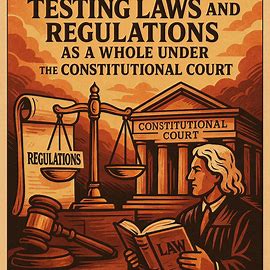Politik Hukum Pengujian Peraturan Perundang-undangan Secara Keseluruhan di Bawah Mahkamah Konstitusi
Abstract
The dualistic authority in judicial review between the Supreme Court and the Constitutional Court in Indonesia has engendered significant legal uncertainties, institutional conflicts, and inconsistencies in the enforcement of laws. While the Supreme Court is mandated to review regulations subordinate to laws, the Constitutional Court holds the authority to review laws against the 1945 Constitution. This bifurcation has led to fragmented legal interpretations and contradictory rulings, undermining the coherence and certainty of the national legal system. This study examines the urgency of consolidating the judicial review authority under the Constitutional Court to enhance legal certainty, uphold constitutional supremacy, and promote justice in Indonesia. Employing a normative juridical approach and comparative legal analysis, the research highlights the advantages of a unified judicial review mechanism as practiced in several constitutional democracies, including Germany and Malaysia. The findings suggest that centralizing judicial review within the Constitutional Court would streamline legal processes, reduce institutional conflicts, and strengthen the protection of constitutional rights. Nonetheless, the study also acknowledges the necessity for capacity building within the Constitutional Court to manage the increased judicial workload effectively. The integration of judicial review authority is thus posited as a critical reform to fortify Indonesia’s constitutional democracy and the rule of law.




1.png)





.png)

.png)







